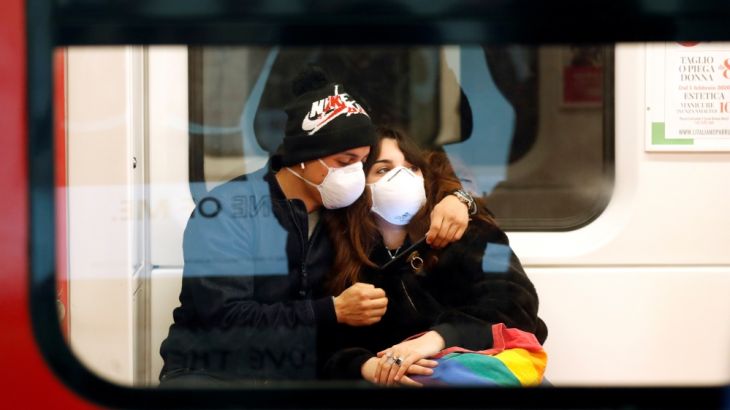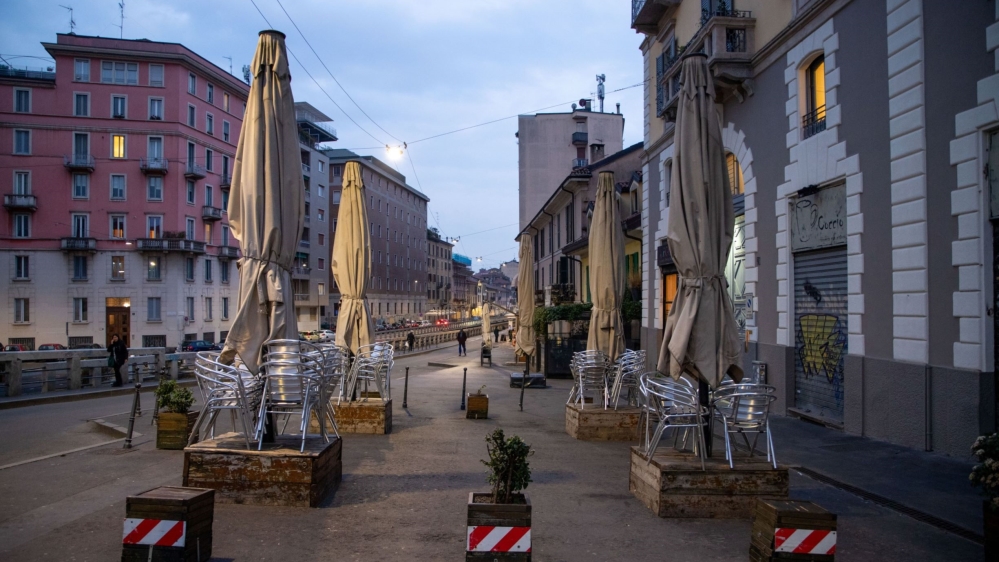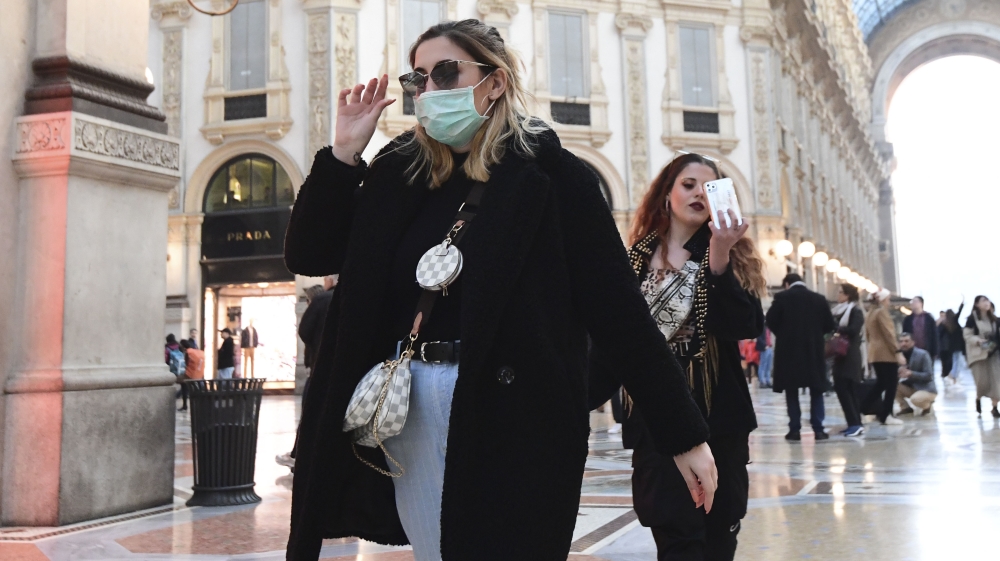Italy struggles with virus ‘that doesn’t respect borders’
Fears mount in Europe as Italy confirms 11 coronavirus deaths, with parts of country’s north under Wuhan-style lockdown.

Turin, Italy – Michele L did not know what to do when he heard that the coronavirus had hit Codogno in northern Italy, less than 10km from his hometown Casalpusterlengo.
An Italian man in his late 30s, identified as Patient 1, had been declared critically ill in Codogno.
Keep reading
list of 4 itemsMexico’s teachers seek relief from pandemic-era spike in school robberies
‘A bad chapter’: Tracing the origins of Ecuador’s rise in gang violence
Why is the US economy so resilient?
It was Friday, and Michele was about an hour’s drive away, in Milan.
Should he stay in Milan or visit his hometown?
“I wondered whether to head back on Friday evening,” he told Al Jazeera. “But 10 days earlier, my brother had spent a few days holidaying in the mountains with a direct colleague of Patient 1. I had flu symptoms and decided it would have been wiser to stay in a containment area, away from other people.”
Codogno is now known as the “Wuhan of Italy” and is in lockdown. Trains do not stop there and the streets are empty.
Within 72 hours from the first outbreak, almost a dozen towns in the wealthy regions of Lombardy and Veneto, with a total population of about 50,000 people, were placed under quarantine.
Now desperately struggling to contain the virus, Italy has the largest number of cases outside Asia and the second-highest number of deaths outside China after Iran, where at least 15 people have died.
All the people who have died in Italy were elderly patients or already had serious preconditions.
Italy is the worst-hit European country. At least 11 people have died after contracting the coronavirus and there are more than 300 cases – most in the north. The 11th person to die was a 76-year-old woman in the Veneto region, officials announced on Tuesday.
“We’re talking about a virus that doesn’t respect borders,” said Italy’s Health Minister Roberto Speranza.
Michele decided to buy protective masks and groceries in Milan, having heard that people were panic buying. He then headed to Casalpusterlengo
“My brother also showed some flu symptoms,” he said. “On Friday evening, I dialled the 112, Italy’s general emergency number. I gave my generalities. A person from the local emergency team said if we hadn’t entertained any direct contact with Patient 1, we would have not needed to undergo the coronavirus-specific swab test. Neither my brother nor myself show any flu symptoms today.”
In a video seen by Al Jazeera shot at the facility where Patient 1 worked, an infectious disease specialist is seen explaining the testing procedure to approximately 300 colleagues who were in contact with Patient 1 before he fell ill.
The specialist tries to calm people down, telling them the short contact they had with Patient 1 lowered their chances of having contracted the virus.
In recent days, schools and museums were closed in major cities, sports and cultural events were cancelled and the Venice carnival was called off. Trade fairs in Milan were postponed. The bars that are still open must observe a curfew.
Meanwhile, the outbreak is impacting Italy’s neighbours.
In Spain, an Italian doctor at a hotel in Tenerife was confirmed to have the virus – that hotel is now on lockdown. An Italian woman in Barcelona was the first confirmed case on the Spanish mainland.
Algeria on Tuesday confirmed its first case, an Italian man who arrived in the country about a week earlier.
In the United Kingdom, three schools were closed after students returned from skiing trips.
The UK and Austria warned its nationals against travel to the affected places in Lombardy and Veneto, while Romania – which has a large number of expatriate workers in Italy, announced that people arriving from the epicentres would be placed under quarantine for two weeks.
The EU has announced the allocation of 232 million euros ($252m) for the coronavirus emergency. Italy’s government said it is considering tax and bills exemptions for people in the towns on lockdown, including Michele’s Casalpusterlengo.
“At the moment, there is a sense of unreality,” Michele said. “Residents have been urged to stay home and special permission is needed to enter or leave the designated areas. I find these measures draconian as they affect people’s civil liberties.”
A few people could be seen around the towns, all of whom wore protective masks.
“I didn’t see any panic on the street,” he said. “But everyone, including myself, has been taken aback by the aggressiveness of the virus and by how quickly the number of the infected patients has grown.”
Authorities still have little information about the identity of the “superspreader”, or Patient 0. While they are still looking for the source, the high number of infected patients has shifted priorities.
According to reports, a hospital in the northern town of Codogno mismanaged the region’s first case and fuelled the infection’s spread.

Michele said there was no systematic distribution of protective masks in Casalpusterlengo. In some areas, they were selling at an inflated price of about 15 euros ($16.3) apiece. In other locations, they had sold out.
People from the isolated areas have criticised a lack of coordination, poor access to emergency hotlines, and a shortage of swabs for testing.
Police and military patrols have been deployed around the towns on lockdown, with officers in surgical masks.
Many residents have said they feel abandoned.
On Tuesday, a patient visiting the hospital in Lodi, capital of the eponymous Lombardy province, for an unrelated health problem told Al Jazeera he was “repeatedly and frantically” asked whether he had flu symptoms, adding that chaos was palpable across the wards.
Prime Minister Giuseppe Conte said on Sunday that the country had taken precautions, including barring flights from China in January. These measures seemed to have paid off even if it appeared otherwise, he said.
Meanwhile, Angelo Borrelli, head of the civil protection agency, told a news conference on Monday that there were no risks for foreign tourists to visit Italy at the moment.
Francesca (not her real name), a 42-year-old Castiglione native, told Al Jazeera she knew several infected people.
An elder cousin and her friend’s uncle, both above 70, live in her Lombardy hometown, which has a population of about 6,000 and is now among the areas in lockdown.
Her friend’s uncle is now in a coma following a heart attack, while his wife also tested positive and was hospitalised.
Francesca’s cousin was taken to a hospital in Lodi and later transferred elsewhere. She said very little information is shared with relatives about the patients’ conditions.
“After people are taken to hospital, information is limited. One is prevented from visiting the person on the premises for obvious reasons. Still, we don’t know much afterwards.
“We are very worried.”
